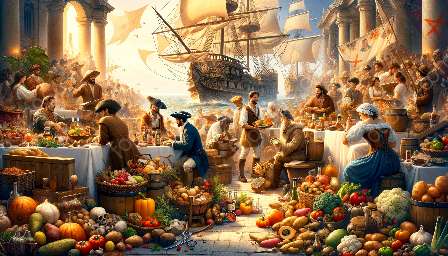The Age of Discovery marked a period of tremendous exploration and the unearthing of new frontiers. However, alongside the discovery of new lands and peoples, a parallel narrative of food discoveries emerged. This era was pivotal in expanding culinary horizons, as explorers voyaged to distant lands and introduced unfamiliar foods to the western world.
Exploration and Discovery of New Foods Throughout History
The exploration and discovery of new foods throughout history have been critical in shaping the culinary landscape of various societies. From the spice trade routes to the Columbian Exchange, the movement of foods across continents significantly impacted global cuisines. The sharing of culinary traditions and ingredients facilitated cross-cultural exchanges and led to the creation of fusion cuisines that endure today.
Food Culture and History
Food culture and history are deeply intertwined, reflecting the evolution of human societies and their interactions with the natural world. Through the lens of food, one can trace the complex interplay of cultural, economic, and environmental factors that have shaped human civilization. From ancient agricultural practices to modern gastronomic trends, the story of food serves as a testament to the diverse experiences and innovations of humanity.
Exploration and Food Discoveries: An Intriguing Intersection
The intersection of exploration and food discoveries offers an intriguing narrative that expands beyond mere sustenance. It encapsulates the spirit of adventure, resilience, and adaptation as individuals ventured into uncharted territories, encountering new flavors and culinary traditions.
Global Impact of Food Discoveries
The global impact of food discoveries during the age of exploration cannot be overstated. The introduction of new crops such as maize, potatoes, and tomatoes revolutionized agriculture and diets. Moreover, the exchange of culinary practices enriched culinary traditions on both sides of the Atlantic, leading to a culinary fusion that continues to define contemporary cuisine.
Explorers and Their Culinary Encounters
Explorers such as Christopher Columbus, Vasco da Gama, and Marco Polo not only charted new territories but also played a pivotal role in the exchange of foodstuffs. Their voyages brought back exotic spices, fruits, and vegetables, forever altering the culinary landscape of Europe and beyond.
Legacy of Exploration and Food Discoveries
The legacy of exploration and food discoveries echoes through the annals of history, resonating in the diverse flavors and ingredients that grace our tables today. It serves as a testament to the profound impact of human curiosity and the enduring legacy of cross-cultural exchange.
Conclusion
The age of exploration was a transformative period that reshaped the course of human history. The interplay between exploration and food discoveries offers a captivating narrative that illuminates the intricate connections between culinary traditions, global exploration, and the diverse tapestry of human experiences.
In understanding the interplay of food discoveries and exploration, we gain a deeper appreciation for the rich tapestry of global cuisines and the enduring legacy of the intrepid explorers who broadened our palates and expanded our culinary horizons.
The exploration and discovery of new foods throughout history have left an indelible mark on food culture and history, reflecting the resilience and adaptability of human societies in the face of new encounters and the thrill of the unknown.

